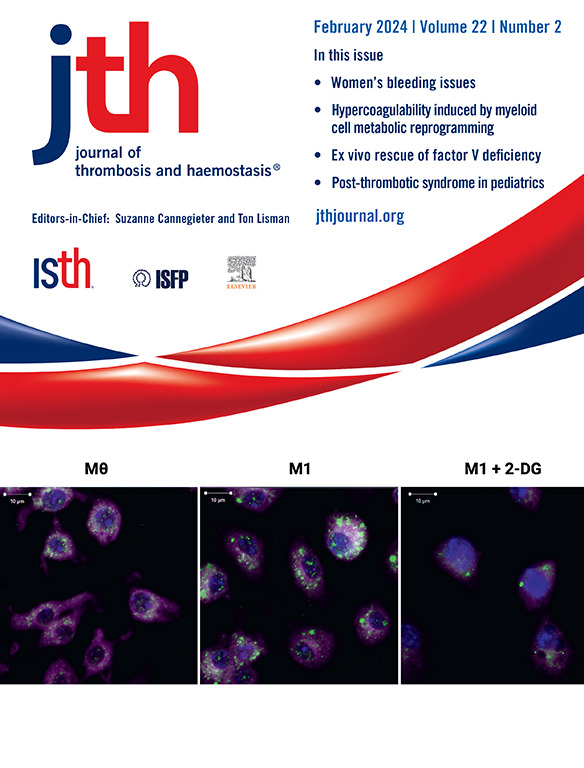Machine learning models for risk prediction of cancer-associated thrombosis: a systematic review and meta-analysis
IF 5.5
2区 医学
Q1 HEMATOLOGY
引用次数: 0
Abstract
Background
Although the number of models for predicting the risk of cancer-associated thrombosis has been rising, there is still a lack of comprehensive assessment for machine learning prediction models.
Objectives
This study aimed to critically appraise and quantify the performance studies using machine learning to predict cancer-associated thrombosis.
Methods
We conducted searches on PubMed, Embase, The Cochrane Library, Cumulative Index to Nursing and Allied Health Literature, and other related databases for the related publications (from inception to December 1, 2023). The Prediction Model Risk of Bias Assessment Tool checklist was employed to evaluate the risk of bias and applicability. The Grading of Recommendations Assessment, Development and Evaluation system was used to evaluate the quality of evidence in systematic reviews. Meta-analyses were conducted using R (version 4.3.2).
Results
A total of 32 studies were included. Mostly included literature exhibited a high risk of bias, and the applicability of the prediction models was deemed acceptable. The 21 included studies in the meta-analysis demonstrated the high predictive capacity of the machine learning models for cancer-associated thrombosis.
Conclusion
Most of the prediction models included in the study showed good applicability and excellent prediction performance, but there was a high risk of bias.
癌症相关血栓风险预测的机器学习模型:系统回顾与元分析》。
背景:虽然预测癌症相关性血栓风险的模型数量不断增加,但目前仍缺乏对机器学习预测模型的全面评估:目的:对使用机器学习预测癌症相关血栓形成的研究进行严格评估和量化:我们在 PubMed、Embase、The Cochrane Library、Cumulative Index to Nursing and Allied Health Literature 等相关数据库中检索了相关出版物(从开始到 2023 年 12 月 1 日)。采用预测模型偏倚风险评估工具核对表来评估偏倚风险和适用性。建议分级评估、发展和评价系统用于评价系统综述的证据质量。使用 R(4.3.2 版)进行元分析:结果:共纳入 32 项研究。大部分纳入文献的偏倚风险较高,预测模型的适用性被认为是可以接受的。荟萃分析中纳入的 21 项研究表明,机器学习模型对癌症相关血栓的预测能力很强:结论:本研究纳入的大多数预测模型显示出良好的适用性和出色的预测性能,但存在较高的偏倚风险。
本文章由计算机程序翻译,如有差异,请以英文原文为准。
求助全文
约1分钟内获得全文
求助全文
来源期刊
CiteScore
24.30
自引率
3.80%
发文量
321
审稿时长
1 months
期刊介绍:
The Journal of Thrombosis and Haemostasis (JTH) serves as the official journal of the International Society on Thrombosis and Haemostasis. It is dedicated to advancing science related to thrombosis, bleeding disorders, and vascular biology through the dissemination and exchange of information and ideas within the global research community.
Types of Publications:
The journal publishes a variety of content, including:
Original research reports
State-of-the-art reviews
Brief reports
Case reports
Invited commentaries on publications in the Journal
Forum articles
Correspondence
Announcements
Scope of Contributions:
Editors invite contributions from both fundamental and clinical domains. These include:
Basic manuscripts on blood coagulation and fibrinolysis
Studies on proteins and reactions related to thrombosis and haemostasis
Research on blood platelets and their interactions with other biological systems, such as the vessel wall, blood cells, and invading organisms
Clinical manuscripts covering various topics including venous thrombosis, arterial disease, hemophilia, bleeding disorders, and platelet diseases
Clinical manuscripts may encompass etiology, diagnostics, prognosis, prevention, and treatment strategies.

 求助内容:
求助内容: 应助结果提醒方式:
应助结果提醒方式:


